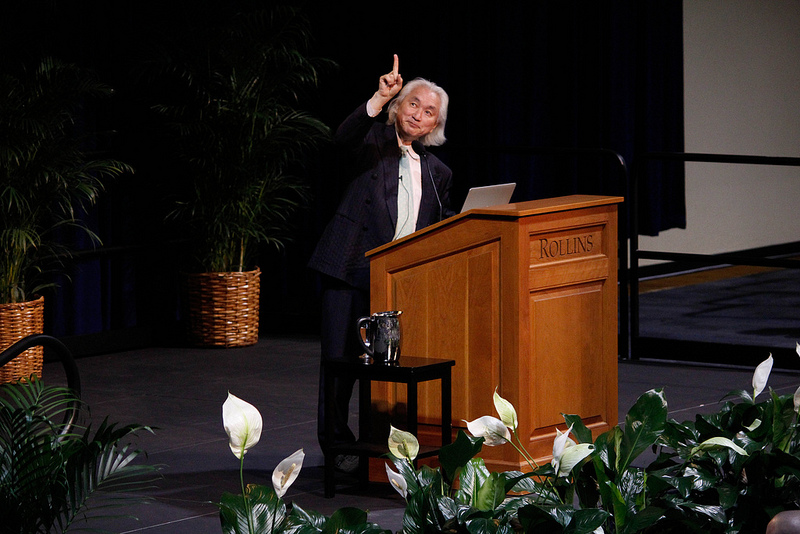[information]For more photos of this event, view our gallery. Also, read one reporter’s review of the WPI talk.[/information]
This past Thursday I had the pleasure to sit down with physicist and futurist Michio Kaku. A prominent media figure, Dr. Kaku is known for co-founding String Field Theory, and his bestselling books about the future of mankind have been extremely well received worldwide.
Q: How has futurology affected your perspective of everyday life?
A: I have the privilege of a front row seat to the future. In my study, I’ve interviewed about 600 of the world’s top scientists. So I get a sneak preview of the future.
For instance, we know that the processing power of computers doubles roughly every 18 months. Using this information we can get a pretty accurate image of the future. 10 years from now this interview would be completely different. A contact lens you wear will be connected to the internet – so when you see me, you’ll see my biography as well. If I speak to you in Chinese, the lens will translate into English subtitles. And if you forgot your interview questions [laughs] well, a script will drop down and you’ll be able to see them again!
Information will be free and instantaneous. By using the internet, a machine will be able to answer your medical questions. Robotic doctors, professors, lawyers will all be easily accessible.
This is not science fiction. This is the world that you will live in within 10, 15 years.
Q: Many in the scientific community refer to you as the ‘popularizer of science’. How do you react to such a title?
A: Well, in the past, if you were a research-active physicist and wanted to popularize science, people would look down on you. But Stephen Hawking, Albert Einstein, they tried very hard to engage the public.
In the 90’s, our [American] attempt to build a Super Collider was canceled, precisely because we could not communicate with the public. The Swiss Large Hadron Collider – that was to be an American machine. But why did Congress cancel it? One congressman asked a physicist, “Will we find God with this machine?” The professor said “We’re going to find the Higgs-Boson particle.” All the jaws in the room hit the floor. 10 billion dollars for a godd*mn subatomic particle.
Since then, we realized that we physicists have a PR problem, [laughs] a big PR problem. I used to be that when we wanted an atom smasher, we went to Congress and say one word: “Russia.” And Congress would say to us two words: “How much?” Those days are gone. Now we have to engage the public, because the public’s paying for our salaries.
Science is the engine of prosperity. Politicians, when they want to get elected they say ‘tax Peter to pay Paul!’ Politics is tax policy. The pie gets cut thinner and thinner. My attitude is “I’m a scientist. We need a bigger pie.” And where will it come from? Well, science! Nobody talks about that. We forgot that in this country.
Q: The Kardashev scale classifies humankind as a Type 0 civilization. Do you believe that our species is on the right track towards Type 1 civilization?
A: I think we are going to be dragged kicking and screaming. There are many forces that don’t like the idea of a Type 1 civilization. For example, terrorists. The future will be pluralistic, multicultural, educated, democratic, and technologically sophisticated, and they don’t want that.
The internet is the beginning of a Type 1 communication system. English is the beginning of a Type 1 language. The Olympics are the beginning of a Type 1 sport. Chanel is the beginning of century, not the 22nd. So, it is, in a sense, a struggle for the future. Type1 high fashion. Pop music is the beginning of Type 1 youth culture.
But there are forces we have to negotiate. The nuclear bomb is proliferating into the most volatile regions of the world. Biological warfare – we have to make sure we can create life that doesn’t bite back. And we have to realize that we are now affecting the weather of the planet.
If we succeed and advance to a Type 1 civilization, we will likely do it by 2100. It’s not clear that we will make it. I think we will, but it’s not clear.
Dr Kaku began to discuss the changing economic structure of the future.
Another lesson – for students worried about the job market. In my book, Physics of the Future, I discuss which jobs will flourish and which will not. The jobs that will are the ones that robots cannot perform. Jobs that require imagination, creativity, talent, experience, engaging in human values. The losers of the future will be middlemen.
I got a plane ticket to come down here. I didn’t go to a travel agent, I just did it myself. In the future, jobs involving inventory, bean counting, those jobs are going to get wiped out. So if you are a broker, or an agent, you have to add value.
You can buy stocks on the internet now, so stock brokers should be out of a job, right? No.
Stock brokers no longer sell stock. They sell knowledge. Experience. The inside track. Imagination, intuition. The ‘inside dope’ as to what analysts think the market is going to do. Bean-counting just can’t cut it anymore. Middle-men are the friction of capitalism. And they’re the jobs that are going to get wiped out. But the robots that will replace them can only do repetitive, simple-minded tasks. We often forget that they are still adding machines. So people should valuetheir education, because soon a college degree is going to be worth even more.
Want to learn more about theoretical physics or futurology? Have a question for Dr. Kaku? Visit his website at http://www.mkaku.org.












Be First to Comment